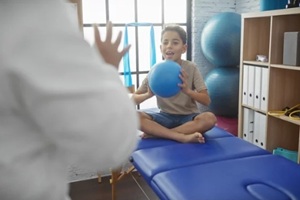
When people think of therapy, they tend to envision an adult reclining on a comfortable couch while a therapist takes notes across the room. While this can undoubtedly be the environment in some therapy offices, adults are not the only ones who can benefit from a therapist’s services. Therapists also often provide children’s therapy, though the best therapists for this task are those whose training specifically equips them to address children’s needs.
Among the many available options, play is one of the best ways to conduct children’s therapy. Play therapy makes mental and emotional processing simpler for children. It has been shown to provide numerous benefits that other approaches, such as talk therapy, are not as successful in providing.
Some of the many therapeutic advantages of play therapy for children include promoting a sense of safety, creating a haven for emotional expression, and helping them develop problem-solving skills while engaging in enjoyable behaviors to streamline learning.
What Is Play Therapy?
Play therapy can take many forms, but it generally involves a therapist sitting in the same room with a child while they play with toys and other materials. The therapist can observe how the child plays, potentially speaking to them as they are occupied with a toy or activity.
In general, the therapist can gain valuable knowledge by observing the child. Are they hesitant to play at all? Do they break toys as part of their experience of fun? These and many more cues can provide insight into a child’s mental and emotional traumas.
How Play Therapy Helps Children
Play therapy is useful for the therapist but is also an accessible way for children to access and benefit from treatment. Some of the advantages that play therapy offers include:
Emotional Expression
It is normal for children to have difficulty regulating their emotions; they are still learning how the world works, and depending on their age, the area of the brain related to emotional control may not yet be formed enough to regulate difficult emotions.

However, play therapy provides an intuitive way for children to express their feelings in a safe space. They may become angry and yell when a toy breaks or grow overwhelmed and reclusive if asked to play alone in an open space. The therapist’s office is a safe area to engage in these behaviors (and learn new, beneficial ones).
Trauma Processing
Asking a child to recount traumatic instances in order to talk through them is often extremely difficult and rarely beneficial. Instead, children find greater success when processing their trauma through play. From drawing pictures to engaging in role-play, children can find a safe buffer between themselves and their trauma, allowing them to work through it and come to terms with it alongside carefully curated conversations with the therapist.
Problem-solving Development
Another advantage of children’s play therapy is the creation of self-efficacy. It is normal for children to rely on adults, but young people must still develop their problem-solving skills. Children struggling in their daily routines can benefit from play therapy as an accessible way to develop their skills to succeed.
The toys they engage with can challenge their brains and encourage the growth of independent thinking and innovative ways to approach difficulties. For instance, if a child finds that the square peg does not fit into the round hole, therapy can guide them to develop a “stop and think” mentality rather than becoming angry and giving up.
Safety and Support
All children need a safe space, and not all of them find that in their daily lives. Therapy is a safe location where they can enjoy support, not only emotionally but also mentally. This safety can help them to grow and develop into people who cope well with challenges.
Behavioral Shifts

In many instances, children will enroll in play therapy because they struggle to maneuver life in a way that matches the benchmarks of a child’s typical development. Play therapy can allow gradual behavioral shifts over time, from frustration when a toy does not work to excitement at the prospect of fixing the toy as a new problem to solve. These changes in behavior will serve children well throughout life.
Support Children With Play Therapy
Therapy is just as appropriate for children as it is for adults, though it often takes a different form. Children’s therapy can incorporate play to encourage young minds to grow in healthy and impactful ways. The professionals at Village Counseling are always happy to welcome children into our offices, where they can find safety and the opportunity for growth. Contact Village Counseling today to schedule a children’s therapy appointment.
